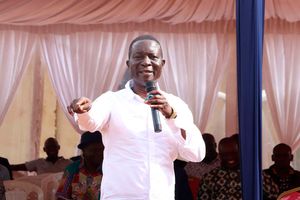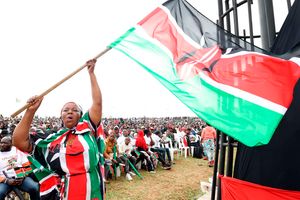
Former Butere MP Martin Shikuku.
Martin Shikuku was a famous politician in Kenya of yesteryears. At the age of 28, he was the youngest member of the delegation that attended the Lancaster Conference in the United Kingdom in the early 1960's. He was a youth representative of the KADU party. In 1963, he was elected MP for Butere in Kakamega. He went on to represent the constituency for many years. He lost the seat in 1997.
He was a firebrand public orator and many dubbed him "the people's watchman".
However, in all those years, Shikuku's reputation in his constituency was not based on development but rather agitation.
It is rumoured that once his constituents asked him to help pave a certain road. Shikuku responded that there was no need for that road to be paved. "If paved, cars will be speeding, causing accidents. Your shoe soles and bicycle tyres will burst due to hot tarmac," he responded. But such responses did not make him less popular.
Indeed that era had other politicians who had thought they would gain legitimacy and people's affection for development but they were wrong.
General Jackson Mulinge was the Chief of General Staff under Moi. He served as an army general with distinction. On retirement, he contested the Kathiani constituency seat and won. As an MP, he initiated major developments, including paving various roads. However, when seeking re-election, he told his people: "Ndimuyeteile sibitali, malelu na balabala". Loosely translated "I have brought hospitals, water and roads". The public would retort "osa" - take them.
He lost.
That 1990's thinking amongst voters, that development does not matter, however, is receding. Voters generally are now giving development more credence. In 2027, this pro-development voter's psyche will be upped due to the following factors.
First, advancing technology in the social media space is creating a new voters’ perception of political reality. Through social media, voters can now see in real-time how advanced other countries are.
This pull factor fuelled by social media incentivises voters to support leaders who can make that world a local reality. Just like owners of typewriters did not realise as the computer revolution swept the public silently, those of us in power might miss the underlying shift in public consciousness fuelled by social media.
Traditional news gatekeepers
Social media has disrupted traditional news gatekeepers in the form of news editors. It has democratised content creation away from a select set of trained journalists.
It has also created a "bubble and echo chamber" amongst people holding similar political views. Social media has reduced news travel time. An occasion happening in Wajir gets instantaneous reporting.
The second factor that will cause a new political dynamic in the 2027 election is the diaspora.
Diaspora remittances are now the leading foreign exchange earner. Kenya's policy is to increase the number of jobs exported.
Kenya needs to look at the political side of the expanding Kenyan diaspora - how these cohorts of Kenyans will change Kenyan politics.
These are Kenyans who have lived in advanced societies like the US, UK, Singapore and Dubai. They now desire a Kenya that mirrors those societies. Historically, countries' diaspora has always caused trouble to the existing social orders of their countries. The Grand Ayatollah Ruhollah spent the years between 1964 to 1979 in exile, including in France, away from the Iranian Shah. He later on inspired a political paradigm shift in 1979.
The Communist Party leaders of China spent their youthful lives in France.
Lenin in 1917 came to Russia from Switzerland. And many other examples of "troubling political leaders".
The third new dynamic will be the maturation of the issue-based campaign style first attempted in 2022.
Politicians in 2022 removed the genie out of the bottle knowingly or unknowingly. They hammered issues and probably 2027 politics will be nudged towards a campaign based on economic platform.
Decentralised funds like the National Government Constituency Development Fund and counties have created a culture of cross-cutting learning and experiences that might imbue a developmental mind change amongst leaders and the general public.
Finally, the youth seems set to play an oversized role in the coming elections.
Kenya's youth bulge - where a large proportion of the population will be young - will now matter politically in 2027. The above dynamics are good for the country. They represent a maturing democracy which might create the necessary conditions for the emergence of pro-development leaders.
Stefan Dercon in his book Gambling on Development: Why Some Countries Lose and Others Win writes that in the last 30 years, some countries have been transformed. Others have been left behind. But why the differences?
He contends the answer does not lie in a specific set of policies but rather in key development bargains, where the political elites shift from protecting their own positions to gambling on a growth-based future.
He cites countries like China, Ethiopia, Rwanda and Mauritius as countries whose elites sought to gain popular legitimacy through development.
He describes the bargain as having the following features: 1. the politics of the bargain are real and credible, not just some vague statement; 2. the capabilities of the state are used to achieve the developmental aims of the bargain and the state avoids doing more than what it can handle; 3. The state has the political and technical abilities to learn from its mistakes and change course.
But often such bargains are induced by crises - legitimacy-seeking behaviour by a country's elites. Like Rwanda civil war. Or the Chinese turbulent cultural revolution. Of course, Kenya has the singular opportunity to achieve this development bargain without undergoing a crisis.
What should Kenyan leaders do? Seize the moment. Create youth-specific programs. Harness the advancing technology. Incorporate diaspora into Kenyan programs.
Most importantly, re-engineer thoughts towards development and establish a development bargain.
Dr Irungu Kangata is the governor of Muranga County. email Franciskangataik@gmail.com.










